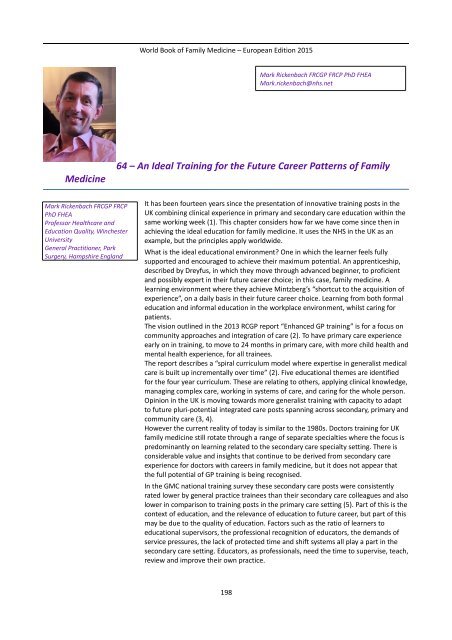Family Medicine
U8UQp
U8UQp
Create successful ePaper yourself
Turn your PDF publications into a flip-book with our unique Google optimized e-Paper software.
World Book of <strong>Family</strong> <strong>Medicine</strong> – European Edition 2015<br />
Mark Rickenbach FRCGP FRCP PhD FHEA<br />
Mark.rickenbach@nhs.net<br />
<strong>Medicine</strong><br />
64 – An Ideal Training for the Future Career Patterns of <strong>Family</strong><br />
Mark Rickenbach FRCGP FRCP<br />
PhD FHEA<br />
Professor Healthcare and<br />
Education Quality, Winchester<br />
University<br />
General Practitioner, Park<br />
Surgery, Hampshire England<br />
It has been fourteen years since the presentation of innovative training posts in the<br />
UK combining clinical experience in primary and secondary care education within the<br />
same working week (1). This chapter considers how far we have come since then in<br />
achieving the ideal education for family medicine. It uses the NHS in the UK as an<br />
example, but the principles apply worldwide.<br />
What is the ideal educational environment? One in which the learner feels fully<br />
supported and encouraged to achieve their maximum potential. An apprenticeship,<br />
described by Dreyfus, in which they move through advanced beginner, to proficient<br />
and possibly expert in their future career choice; in this case, family medicine. A<br />
learning environment where they achieve Mintzberg’s “shortcut to the acquisition of<br />
experience”, on a daily basis in their future career choice. Learning from both formal<br />
education and informal education in the workplace environment, whilst caring for<br />
patients.<br />
The vision outlined in the 2013 RCGP report “Enhanced GP training” is for a focus on<br />
community approaches and integration of care (2). To have primary care experience<br />
early on in training, to move to 24 months in primary care, with more child health and<br />
mental health experience, for all trainees.<br />
The report describes a “spiral curriculum model where expertise in generalist medical<br />
care is built up incrementally over time” (2). Five educational themes are identified<br />
for the four year curriculum. These are relating to others, applying clinical knowledge,<br />
managing complex care, working in systems of care, and caring for the whole person.<br />
Opinion in the UK is moving towards more generalist training with capacity to adapt<br />
to future pluri-potential integrated care posts spanning across secondary, primary and<br />
community care (3, 4).<br />
However the current reality of today is similar to the 1980s. Doctors training for UK<br />
family medicine still rotate through a range of separate specialties where the focus is<br />
predominantly on learning related to the secondary care specialty setting. There is<br />
considerable value and insights that continue to be derived from secondary care<br />
experience for doctors with careers in family medicine, but it does not appear that<br />
the full potential of GP training is being recognised.<br />
In the GMC national training survey these secondary care posts were consistently<br />
rated lower by general practice trainees than their secondary care colleagues and also<br />
lower in comparison to training posts in the primary care setting (5). Part of this is the<br />
context of education, and the relevance of education to future career, but part of this<br />
may be due to the quality of education. Factors such as the ratio of learners to<br />
educational supervisors, the professional recognition of educators, the demands of<br />
service pressures, the lack of protected time and shift systems all play a part in the<br />
secondary care setting. Educators, as professionals, need the time to supervise, teach,<br />
review and improve their own practice.<br />
198



